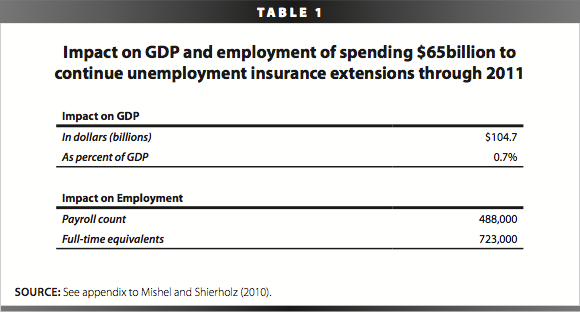Issue Brief #288
Further extending unemployment insurance benefits will generate over 700,000 full-time-equivalent jobs while saving millions from poverty
On November 30th, the federally funded extended unemployment insurance (UI) benefits are set to expire. These benefits serve two very useful public purposes. One is to assist the unemployed during the deepest and longest recession since the 1930s. Less well known is the second purpose, which is to boost spending in the economy and therefore generate jobs at a time when we have substantial excess capacity and unemployment. This issue brief calculates the impact on employment of continuing the extended weeks of UI benefits through 2011. It is an update to the July issue brief Two for the Price of One (Mishel and Shierholz 2010), where we estimated that spending related to the expansion of the unemployment insurance system, both the regular program and the expanded federal supports for the unemployed, generated 1.7 million full-time-equivalent jobs in the first quarter of 2010 that otherwise would not have existed.
Table 1 gives the impact in terms of both gross domestic product (GDP) and employment of continuing through 2011 the federally funded unemployment insurance extensions that are currently in place. (The numbers in this table are calculated using the methodology described in the appendix of Mishel and Shierholz (2010).) The estimated cost of continuing the extensions through 2011 is $65 billion. The economic impact of this spending is much higher, however, because of its large “multiplier” effect. UI benefits for the long-term unemployed give the economy a particularly big boost because long-term unemployed workers are very unlikely to have any choice but to immediately spend their unemployment benefits. The resulting spending on rent, groceries, and other necessities saves and creates jobs throughout the economy. For this reason, government spending on unemployment insurance benefits during a downturn is recognized by the Congressional Budget office (CBO) as one of the most efficient things that can be done to create new jobs. Spending $65 billion on unemployment insurance extensions will increase GDP by an estimated $104.7 billion, which is roughly 0.7% of our $14.7 trillion GDP. This increase in GDP translates into 488,000 payroll jobs. In other words, extending the federally funded unemployment insurance extensions through 2011 would not only be a lifeline to the families of millions of unemployed workers, it also supports spending responsible for the existence of nearly half a million jobs.

